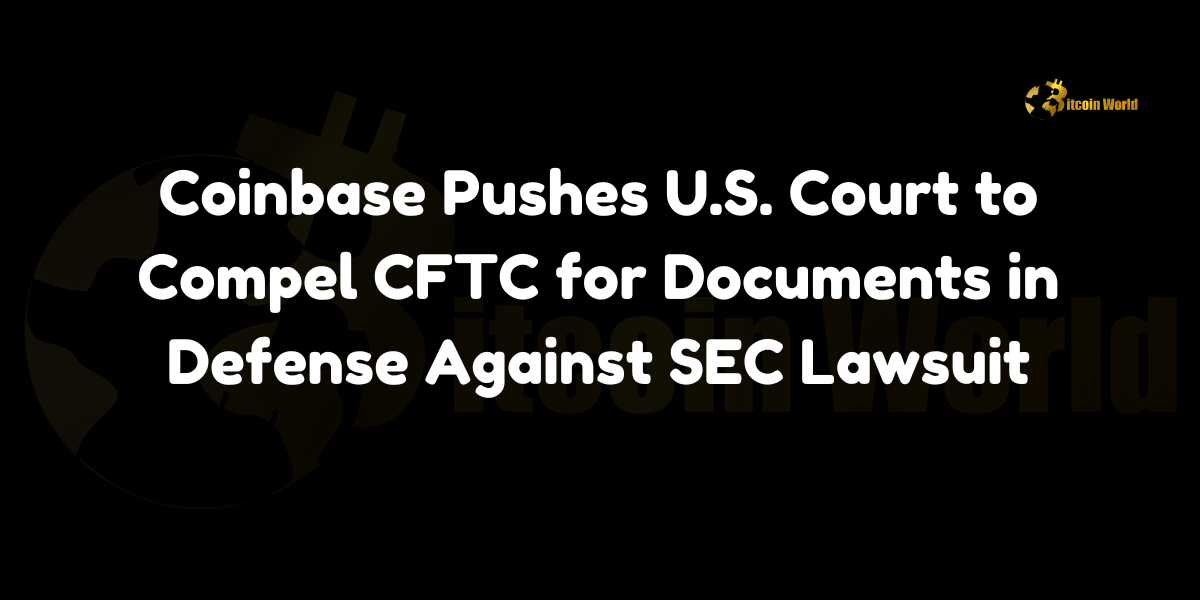Coinbase Pushes U.S. Court to Compel CFTC for Documents in Defense Against SEC Lawsuit
In a significant legal maneuver, Coinbase has filed a motion in a U.S. federal court seeking to compel the Commodity Futures Trading Commission (CFTC) to disclose its communications with the issuers of 12 cryptocurrencies that the Securities and Exchange Commission (SEC) has classified as unregistered securities. According to a report by Cointelegraph, this move is part of Coinbase’s defense strategy in response to the SEC’s ongoing lawsuit, which accuses the exchange of operating illegally as a broker and securities exchange without proper registration.
Coinbase contends that obtaining these communications from the CFTC is crucial to determining whether the tokens in question should indeed be classified as securities under U.S. law.
Background on the SEC Lawsuit Against Coinbase
The SEC filed its lawsuit against Coinbase earlier this year, alleging that the crypto exchange violated securities laws by offering tokens that the SEC claims are unregistered securities. The SEC’s suit centers around Coinbase’s listing of 12 specific cryptocurrencies, arguing that these digital assets meet the definition of securities under the Howey Test and that Coinbase, therefore, should have registered as a securities exchange and broker.
Coinbase, on the other hand, has strongly denied these claims, arguing that the tokens do not meet the legal criteria for securities. The exchange has maintained that the SEC’s approach to regulating cryptocurrencies is inconsistent and that clearer guidelines are needed.
Why Coinbase is Seeking CFTC Documents
By compelling the CFTC to disclose its communications with the issuers of these 12 cryptocurrencies, Coinbase aims to gather evidence that could potentially undermine the SEC’s classification of the tokens as securities. Coinbase argues that the CFTC’s interactions with the issuers could reveal how other regulatory bodies view these digital assets, potentially showing a lack of consensus on whether they qualify as securities or commodities.
The CFTC oversees commodities and futures markets, and the regulatory distinction between what constitutes a commodity versus a security has been a key issue in the legal debate surrounding cryptocurrencies. By obtaining these documents, Coinbase could strengthen its defense by demonstrating that the tokens in question have been treated more as commodities by other regulatory bodies, particularly the CFTC.
Coinbase’s legal team has emphasized that understanding how the CFTC has communicated with token issuers is essential to challenging the SEC’s assertions and defending itself against the lawsuit. The court filing argues that these communications could provide critical context for how these digital assets have been regulated—or not regulated—by other U.S. agencies.
Legal and Regulatory Implications
Coinbase’s request to compel the CFTC to provide documents is part of a broader effort to highlight the regulatory uncertainty surrounding cryptocurrencies in the U.S. This case has drawn significant attention from the cryptocurrency industry and legal experts, as it underscores the ongoing jurisdictional conflicts between regulatory bodies such as the SEC and CFTC.
The outcome of this case could have far-reaching implications for the regulation of cryptocurrencies in the U.S. If Coinbase succeeds in compelling the CFTC to release the requested documents and can demonstrate that the CFTC does not view these tokens as securities, it could significantly weaken the SEC’s case. Such a development could also prompt broader discussions about how to classify and regulate digital assets moving forward.
Moreover, the case could serve as a precedent for future lawsuits involving cryptocurrency exchanges and token issuers. The SEC’s approach to regulation, which some in the industry view as overly aggressive and unclear, has led to calls for a unified regulatory framework that provides more clarity on how cryptocurrencies are classified and treated under U.S. law.
Coinbase’s Defense and Broader Industry Support
Coinbase has consistently argued that it operates within legal boundaries and has called on U.S. regulators to provide clearer guidance for the cryptocurrency industry. The exchange has sought to distance itself from allegations that it intentionally listed unregistered securities, framing the SEC’s lawsuit as part of a broader regulatory overreach that stifles innovation in the blockchain and digital asset space.
Coinbase’s defense has also garnered support from other players in the cryptocurrency industry, who share concerns about the lack of regulatory clarity in the U.S. market. Many believe that the SEC’s enforcement-driven approach to crypto regulation has created an environment of uncertainty, which has led some companies to relocate operations to more crypto-friendly jurisdictions.
Conclusion
As Coinbase pushes for the CFTC to disclose communications with the issuers of the cryptocurrencies at the center of the SEC’s lawsuit, the legal battle is set to intensify. Coinbase’s motion to compel the CFTC highlights the complex and often conflicting nature of U.S. cryptocurrency regulation. If successful, Coinbase could gain valuable evidence to challenge the SEC’s classification of the tokens as securities, potentially reshaping the regulatory landscape for cryptocurrencies in the U.S.
The outcome of this case will be closely watched by both the cryptocurrency industry and regulators, as it could have significant implications for the future of crypto regulation in the country.
To learn more about the innovative startups shaping the future of the crypto industry, explore our article on latest news, where we delve into the most promising ventures and their potential to disrupt traditional industries.
Disclaimer: The information provided is not trading advice, Bitcoinworld.co.in holds no liability for any investments made based on the information provided on this page. We strongly recommend independent research and/or consultation with a qualified professional before making any investment decisions.




